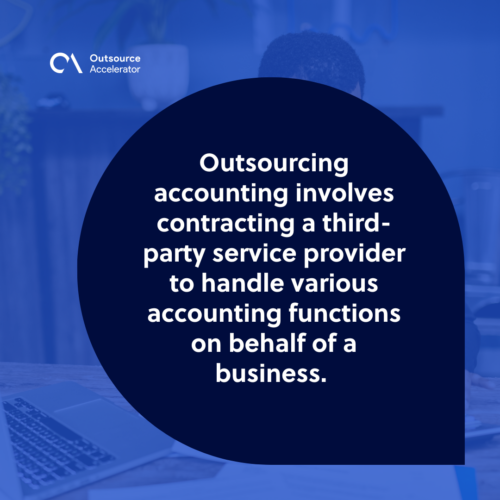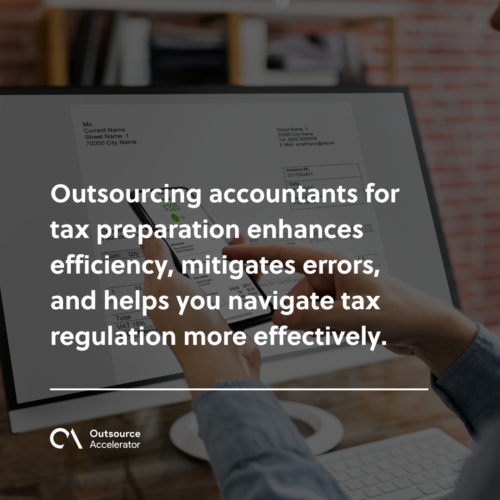Numbers made easy: Outsourcing accountants 101

Accounting is just one of the many tedious aspects of managing a business.
We get it. You want to focus on your restaurant or health clinic, not deal with all these numbers. Still, keeping your finances in check is crucial to your long-term success.
Thankfully, outsourcing accountants is a solution. If you can’t hire your own accountants, there’s no reason you can’t find them elsewhere.
Outsourcing accountants to expert providers like Clark Staff lets you get your finances under control.
How does outsourcing accounting work?
Outsourcing accounting involves contracting a third-party service provider to handle various accounting functions on behalf of a business.
For your part, you must identify your accounting needs and select the right service provider. Together you’ll discuss the scope of work and clarify tasks, responsibilities, timelines, and deliverables.
Good outsourcing contracts rely on effective communication channels. You’ll share sensitive financial information with your outsourcing partner, so ensure you operate on secure networks.
As the outsourced accountants perform their tasks, they’ll maintain regular contact with your business. Note that you can always review their work and ask for quality assurance checks.
Outsourcing lets you focus on your core competencies while ensuring accurate and compliant financial management.

Common roles when outsourcing accountants
When outsourcing accountants, businesses can delegate various accounting functions and tasks to external providers.
Common roles often outsourced to accountants include:
General accounting
General accounting in outsourcing refers to having basic accounting functions and tasks handled by an external service provider. These tasks typically involve routine and essential accounting activities fundamental to maintaining accurate financial records.
Outsourcing general accounting functions allows businesses to focus on core activities while entrusting routine financial tasks to specialized firms.
Accounts payable
When outsourcing accountants, businesses typically delegate the role of managing accounts payable (AP) and accounts receivable (AR). These two functions are critical for maintaining a healthy cash flow and managing relationships with vendors and customers.
Accounts payable manages and tracks a company’s outstanding payments to vendors and suppliers. It’s the amount a business owes for services purchased on credit.
Accounts payable represent the short-term liabilities of a company. It is itself listed as a current liability on the balance sheet.
Outsourced accountants may handle the following responsibilities:
- Invoice processing
- Payment processing
- Vendor management
- Expense tracking and reporting
Accounts receivable
Accounts receivable is the opposite, referring to what is owed to the company for goods and services provided on credit. This role also ensures the timely collection of payments.
Outsourced accountants may have the following responsibilities:
- Invoicing and billing
- Payment processing and reconciliation
- Collections and aging analysis
- Customer account management
- Cash flow forecasting
Bookkeeping
Bookkeeping is a commonly outsourced role, as it is a fundamental accounting function. It involves recording and organizing financial transactions for a business.
Bookkeeping systematically documents and classifies financial data to ensure accurate financial records. It is essential for monitoring the financial health of a company.
The following duties can be delegated to an outsourced accountant:
- Transaction recording
- General ledger maintenance
- Bank reconciliation
- Financial reporting
- Compliance and documentation
- Data entry and organization
Payroll and benefits
Managing payroll and administering employee benefits accurately can be complex and time-consuming. Outsourcing accountants to handle these functions is a viable option today.
Outsourcing payroll processing involves calculating and distributing employee salaries and wages. Outsourced accountants perform the following tasks:
- Payroll calculation
- Tax withholding and reporting
- Payslip generation
- Direct deposits and payments
- Compliance and reporting
Further, outsourced accountants handle employee benefits, such as health insurance, retirement plans, disability coverage, and other offerings.
This role also includes the following tasks:
- Enrollment and eligibility
- Benefit deductions and contributions
- Benefits communication
- Open enrollment support
Internal and external auditing
Auditing functions provide valuable insights into a company’s financial operations, internal controls, and regulation compliance.
Internal auditing is a systematic and disciplined approach to examining an organization’s activities to ensure alignment with policies and requirements. It assures management and stakeholders that internal controls are effective, risks are identified, and objectives are being achieved.
External auditing is when an external audit firm independently examines a company’s financial statements. This type of auditing also assures shareholders, investors, lenders, and regulatory bodies.
Outsourcing accountants to conduct auditing tasks allows businesses to tap into specialized expertise while maintaining independence and objectivity.
Tax preparation
Tax preparation is a critical aspect of accounting, especially for small businesses. Outsourcing accountants for tax preparation enhances efficiency, mitigates errors, and helps you navigate tax regulation more effectively.
Outsourced accountants have these key obligations:
- Gathering and organizing tax information
- Tax calculation and reporting
- Compliance with tax regulations
- Tax planning and optimization
- Correspondence and representation

Benefits of outsourcing accountants
Outsourcing accountants can offer several benefits to businesses. Here are some of the key advantages:
Cost savings
Outsourcing accountants leads to significant cost savings for businesses. By outsourcing, companies can avoid the expenses associated with hiring, training, and retaining full-time accounting staff.
It also eliminates costs for providing office space, equipment, software, and certain employee benefits. You get professional accounting services at a fraction of the cost of an in-house team.
Access to specialized expertise and tools
By outsourcing accountants, you gain access to a global talent pool. It won’t be too difficult to find what you need because these professionals have expertise in various areas of accounting.
Outsourced accountants and their firms also often have access to advanced accounting software, tools, and technologies. You can leverage the latest without investing in expensive systems yourself.
Scalability and flexibility
Outsourcing accountants provides businesses with scalability and flexibility. As these organizations grow or experience fluctuations in their accounting needs, outsourcing allows them to adjust the level of accounting support required easily.
Businesses can add or remove members of their offshore accounting team as needed. This avoids the challenges associated with hiring or downsizing in-house teams.
Clark Staff handles all the above responsibilities and more. Its professional teams have proven able to adapt to the changing needs of modern businesses. Clark Staff should be at the top of your list if you’re looking for a firm with experience in the outsourcing accounting field.
Contact Clark Staff today for your accounting services needs!







 Independent
Independent




